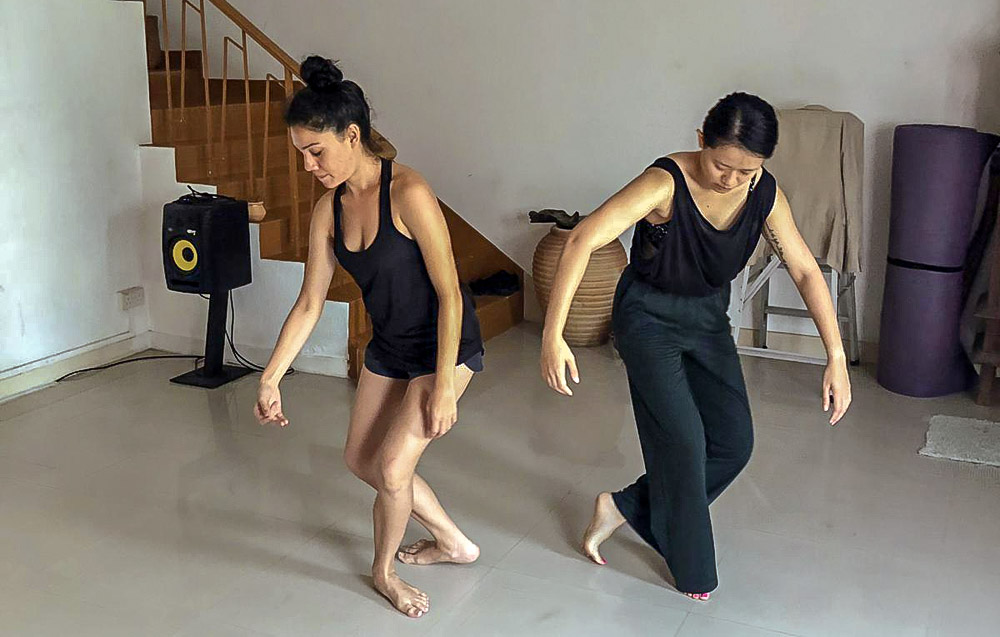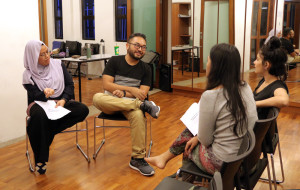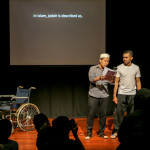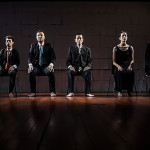
Sharda Harrison (left) rehearsing the Pink Gajah Theatre performance response De-Construction with Sonia Kwek (right). Image: Sharda Harrison
Here at Centre 42, we love bringing artists together. That is why, at this year’s Late-Night Texting, we present Verso / Recto, a dialogue between Main Tulis Group and Pink Gajah Theatre. We challenged these two theatre groups to create performative responses to the same set of poems. With the groups’ own distinctive styles of making theatre through text and movement respectively, audiences can see two sides of the same poetic page come to life, ergo, Verso / Recto.
The poems, carefully curated by BooksActually, are A Few Ways To Eat A City Raw by Ko Ko Thett, The Spirit Catches You and You Fall Down by Lee Jing Jing and From “Argentine Tango: Observations while Dancing” (Part 6) by Mong-Lan.
Main Tulis Group, a playwriting circle dedicated to developing English and Malay scripts, will be presenting three short scripts co-written by their members. One of the scripts, Spittle Splatter (Tempias Lagi), was written by Farhanah Diyanah, better known as FD, alongside fellow Main Tulis Group playwright Adib Kosnan. The pair were responding to A Few Ways to Eat the City Raw.
Pink Gajah Theatre, a movement-based company, will also be presenting three responses that feature movement, mask work, and sound design. Sharda Harrison, the artistic director of Pink Gajah Theatre, is responding to all three poems with collaborators Sonia Kwek, Lian Sutton and Lim Mei Yin.
We speak to FD and Sharda to find out more about the creative process behind their responses to the poems.
How was it like encountering the poems for the first time?
Farhanah Diyanah (FD): Adib and I met once to talk about what stood out for us in [A Few Ways to Eat the City Raw]. I think for the visuals, [what stood out for me were the] durian, and traffic lights. Then Adib [focused on] the city and the emotions behind it. Other than the symbols, I also mentioned that when I thought about the city, I thought about corporate life. And then he brought up idealism and realism, [the] two philosophies.
Sharda Harrison (SH): Beautiful I suppose. You’re entering someone else’s mind, and wondering what they’re all about. Of course, there was that pressure of [having] to think about how to bring it to life. [The Spirit Catches You and Then You Fall Down] was more like a memory that was captured in time that was frozen. It stood still for me.
I think A Few Ways to Eat the City Raw [is a] very charismatic poem. It grows on me. [The poem brings you to] an island with a lover and then it pulls out back to the city. And then it brings you back into your own conflict of whether you want, in my opinion, this material life.
I don’t really like my relationship with the city. [It’s the] same thing every other day. But then within it I find a lot of precious gems. I like finding things. I like animals in the city. I get very excited when I see hornbill, [or] civet cats. [When] I see mynahs even. Little praying corners, alters. I like to see the grit in the city. I remember once we were working with overseas artists they were like, “Your city’s too clean.” And I said our dirt is in the cleanliness, we sweep it up at night and we hide everything we have. We are very manicured in the city in Singapore. But I love my Singapore. I just I have a frustrated relationship [with it], which you will see in the piece.

(From left) FD and Adib Kosnan, playwrights of Spittle Spattle, in discussion with performers Rusydinah Afiqah and Mehr Dudeja.
So how did you start to respond to the poems from there?
FD: What Adib and I did during that first meeting was to decide that one of us was going to respond from the perspective of either the idealist or the realist. We tikam-tikam [Malay for “drew lots”] and Adib got ‘realist’ and I got ‘idealist’. So, we responded by writing a monologue in the voice of either the idealist or the realist. Then, we responded to those two [preliminary] responses that we did. I [then] started creating the first part of the script with whatever the both of us had written, with this premise and also the city, in mind.
I stopped at the climax of the piece and then I asked Adib if he was interested to continue the story and finish it. In a way, he could not change how I started the story and I could not change how he ended the story.
SH: My first response was I wanted to use images from all my past work. The ladder comes from BI(CARA) (2016). The suitcases, the luggage idea of bags come from Thinking About Death (2016). Some music comes from the past work as well.
We started off [by] recycling, because there wasn’t enough time. Then the images arose. It was like, “Oh, well, we’ve got two bags. What we’re going to do with these two bags? Oh, we’ve got a ladder. What are we going to do with the ladder?” So, the response came with the concept first, and then imagery, and then choreography. And then meaning-making. Meaning-making for me comes last.
Lian is very interested in Silat, the body and mask work. We thought that would be suitable for the style that we’re doing [The Spirit Catches You and You Fall Down] in because the [Balinese masks Lian uses] are about spirits. The belief is that you let the spirit of the mask enter you [when you wear it], which is in line with the poem.
How are rehearsals like?
FD: [As a writer] I think it’s always nice to see your script being presented in the proper form, when you have good actors that can materialise the lines that you write. It’s also nice that when the actors (Rusydina Afiqah & Mehr Dudeja) don’t understand some lines that we have written, they will ask, “What is the motivation behind this line?” Then both Adib and I will explain [what we felt at the point of writing].
SH: My rehearsals are very casual. My room is casual because I choose to work with people that have had the training. So, if someone has been invited to come into the space to train and to make work, they have to know the team. They have to know their ritual. They have to do the work. Otherwise, I’m very casual. I’m not like, “No! We need to find an answer!” If the answer is not coming today, it’s not coming today.
I like working with people that are investigators of their own craft. Sonia has her own practice, Lian has his own practice and I have my own practice. So, it’s less of me directing people, sort of me collaborating.
What do you think about creating art in response to something else?
FD: I always like the idea of having a text and then giving it a new home. I do enjoy [responding to texts] because you get to dissect the work any way you want. You get to pick whether you want to take the essence of the poem, or if you want to take the visuals and the symbols of what you see and transform it to something else. I love seeing how one form changes to another form. It can be a play, it can be music, sound design or visual art. It can be anything.
I hope that people appreciate the poem as well as the responses that we have made. Perhaps somebody else will respond to us!
SH: I like that everything is just a response to something. Everything usually starts off with a question, right? A lot of art-making is about trying to solve something in society, but I’ve never responded that way. I’ve responded to myself a lot. So, a lot of my work is actually quite narcissistic. BI(CARA), [was] because I care about animals. Hayat (2018) was because I love my mom.
But [for Verso / Recto], I was thrown three things that I had to think about! And maybe I didn’t want to think about them, like, “Why do I have to do something about the city? I don’t care about the tango!” But it’s helping me make art that’s different from what I normally do and it’s teaching me new things, like how to just relax and trust the concept and the flow.
By Lee Shu Yu
Published on 25 August 2019
Verso / Recto is a series of 30-minute double bill performances that will be performed at Late-Night Texting on 30 and 31 August 2019. Click here for more information.





